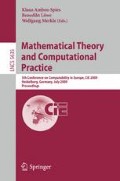Abstract
Computational proof interpretations enrich the logical meaning of formula connectives and quantifiers with algorithmic relevance and allow to extract the construction contained in a proof. Berger showed that quantifiers can be selectively declared irrelevant for the modified realisability interpretation, thus removing unnecessary computation from the extracted program [1]. Hernest adapted the uniform quantifiers to Gödel’s Dialectica interpretation [2] and later demonstrated together with the author how they can be refined [5]. The present paper gives a further extension, in which the computational meaning can be controlled separately for every component of the Dialectica interpretation. Apart from enriching the possibilities to remove redundancies in extracted programs, this finer approach also allows to independently switch off the postive or negative algorithmic contribution of whole formulas.
Access this chapter
Tax calculation will be finalised at checkout
Purchases are for personal use only
Preview
Unable to display preview. Download preview PDF.
References
Berger, U.: Uniform Heyting Arithmetic. Ann. Pure Appl. Logic 133(1-3), 125–148 (2005)
Hernest, M.-D.: Optimized programs from (non-constructive) proofs by the light (monotone) Dialectica interpretation. PhD thesis (2007)
Gödel, K.: Über eine bisher noch nicht benützte Erweiterung des finiten Standpunktes. Dialectica 12, 280–287 (1958)
Hernest, M.-D., Oliva, P.: Hybrid functional interpretations. In: Beckmann, A., Dimitracopoulos, C., Löwe, B. (eds.) CiE 2008. LNCS, vol. 5028, pp. 251–260. Springer, Heidelberg (2008)
Hernest, M.-D., Trifonov, T.: Light dialectica revisited. Submitted to APAL (2008), http://www.math.lmu.de/~trifonov/papers/ldrev.pdf
Kreisel, G.: Interpretation of analysis by means of constructive functionals of finite types. In: Heyting, A. (ed.) Constructivity in Mathematics, pp. 101–128. North-Holland Publishing Company, Amsterdam (1959)
Schwichtenberg, H.: Dialectica interpretation of well-founded induction. Mathematical Logic Quarterly 54(3), 229–239 (2008)
Troelstra, A.S.: Metamathematical Investigation of Intuitionistic Arithmetic and Analysis. Lecture Notes in Mathematics, vol. 344. Springer, Heidelberg (1973)
Author information
Authors and Affiliations
Editor information
Editors and Affiliations
Rights and permissions
Copyright information
© 2009 Springer-Verlag Berlin Heidelberg
About this paper
Cite this paper
Trifonov, T. (2009). Dialectica Interpretation with Fine Computational Control. In: Ambos-Spies, K., Löwe, B., Merkle, W. (eds) Mathematical Theory and Computational Practice. CiE 2009. Lecture Notes in Computer Science, vol 5635. Springer, Berlin, Heidelberg. https://doi.org/10.1007/978-3-642-03073-4_48
Download citation
DOI: https://doi.org/10.1007/978-3-642-03073-4_48
Publisher Name: Springer, Berlin, Heidelberg
Print ISBN: 978-3-642-03072-7
Online ISBN: 978-3-642-03073-4
eBook Packages: Computer ScienceComputer Science (R0)

